Welcome to Knock Knock Recording Studio!
Hey Steemians! I've entered a few rap contests here on Steemit (hosted by @rondonson and @vocalists-trail) and had the good fortune to win a few but that is only one aspect of my musical side.
My day job is recording, mixing, and mastering music full-time here at Knock Knock Recording Studio that I designed and built with the help of my co-investors here in San Francisco! I've been very blessed to not only succeed in constructing the studio, but also building a client base in only a couple years to where I can pay rent in San Francisco off doing what I love. One album I recorded and mixed even made it to the SF Weekly top 5 Bay Area Albums of 2016 list. The more people I have through the studio the more I realize how few people even know how to start thinking about planning a studio, so here I'm going to share some of the process in hopes it inspires others to building/honing their own space!
(Here is the Google Sketchup of the studio design in progress; the only thing that changed was the vocal booth (smallest room) got rotated to be parallel lengthwise with the control room)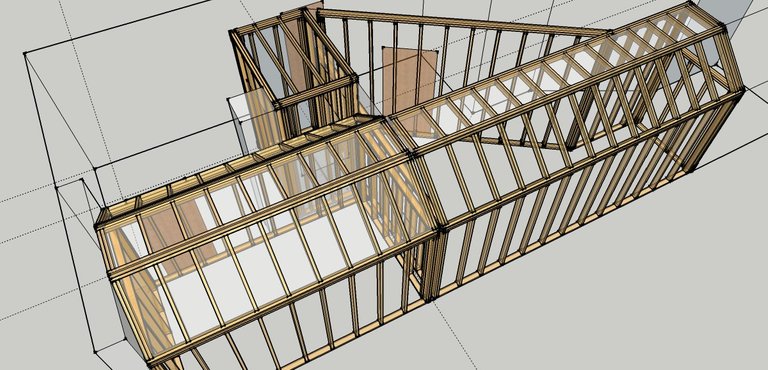
A little backstory
First off, I went to school at San Francisco State University which has an amazing audio recording/production emphasis and graduated in 2013. During my schooling I saw many people become disheartened with the current interning dance at professional recording studios and rather than subject myself to that I figured I might as well just build my own.. (honestly didn't realize how hard it would be haha) After graduation I worked extremely hard for a year to save money, then I found other co-investors who were willing to sacrifice garage space for a studio and got to work. Finding a space in San Francisco with a big enough garage to fit a Control Room, Live Room, and Vocal Booth turned out to be a couple month process but we stayed vigilant and finally found the perfect space!
Designing and Building
As much as I learned about recording and mixing at SFSU, there were no classes on studio design or room acoustics so after graduating I had to research this all myself. One of the most indispensable resources for me in this journey was a book by Rod Gervais titled Build it like the Pros.
The above book helped me realize I needed to think about:
- Soundproofing- stopping source sound from getting out during tracking, and non source sound from getting in
- Room Shape/Acoustics- the actual shape of my rooms and how they effect the sound that travels in them
- Acoustic Treatment- using absorption and diffusion in the proper arrangement to essentially tune a room to the proper listening or recording environment (heavy absorption in the Vocal Booth, less in the Live Room)
Details:
Soundproofing
This in and of itself is one of the biggest choices you can make and what determines how loud the source material you can record, as well as when you can record. Multi-million dollar studios have floating floors actually sitting on springs to absorb the vibration of sound waves but that wasn't something we could afford. What we did employ for soundproofing was:
-Separate structures for each room, not attached to each other or the current housing structure.
-2 layers of 5/8" thick sheetrock on each wall with a viscoelastic compound known as Green Glue between the layers
-Laminated glass windows (1/2" thick for Control Room and Vocal Booth, 3/4" thick for Live Room)
-Super doors made of sandwiching 1/8" lead between a solid core door and medium density fiberboard (MDF)
(Super door assembly but with 3/4" plywood instead of the MDF board we used)
Room Shape/Acoustics
The most important thing for how each room will sound (while in it). The basic rule of thumb is rooms you record in such as Live Rooms do not want to have parallel walls for the sound to bounce back and forth. This bounce between parallel walls results in flutter echo which produces unwanted artifacts while recording. One exception to this rule is Vocal Booths that are completely treated with absorption: the walls are so dead that the sound has no chance to bounce back and forth causing a problem. On the other hand, Control Rooms should be designed symmetrically so that the sound can travel evenly in all directions and not give a distorted stereo image. With proper treatment (usually absorption for smaller rooms, diffusion for larger) the potential for flutter echo can be avoided.
Below shows flutter echo in action, nooooooooooo!
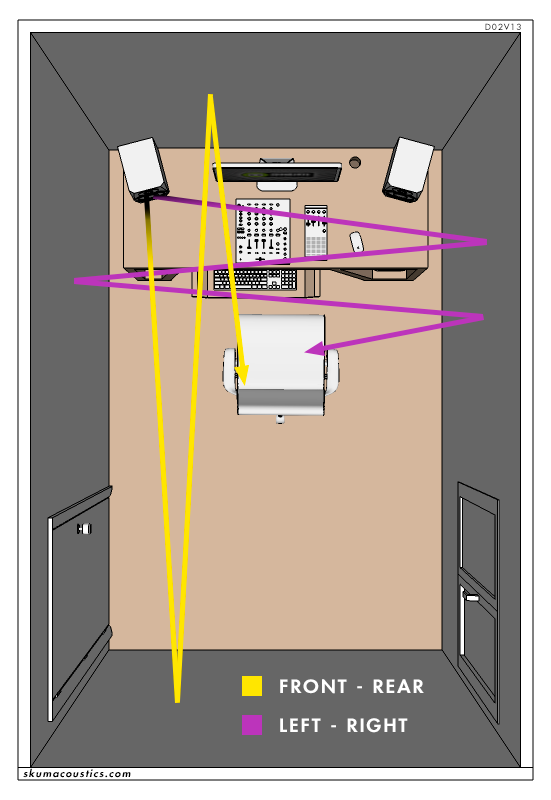
Acoustic Treatment
We have touched on this a little but basically there are two main forms of acoustic treatment: Absorption and Diffusion
Absorption- pretty self explanatory, it absorbs the incoming sounds and stops or lessens their travel in the room. The best absorbers are broadband meaning that they effectively absorb all frequencies evenly (or as close as possible). Our vocal booth has home made Absorption panels on all the walls (except the windows) for a completely dead vocal booth that lets us add whatever reverb or room tone we desire after.
This shows a Control Room using Absorption to minimize flutter echo
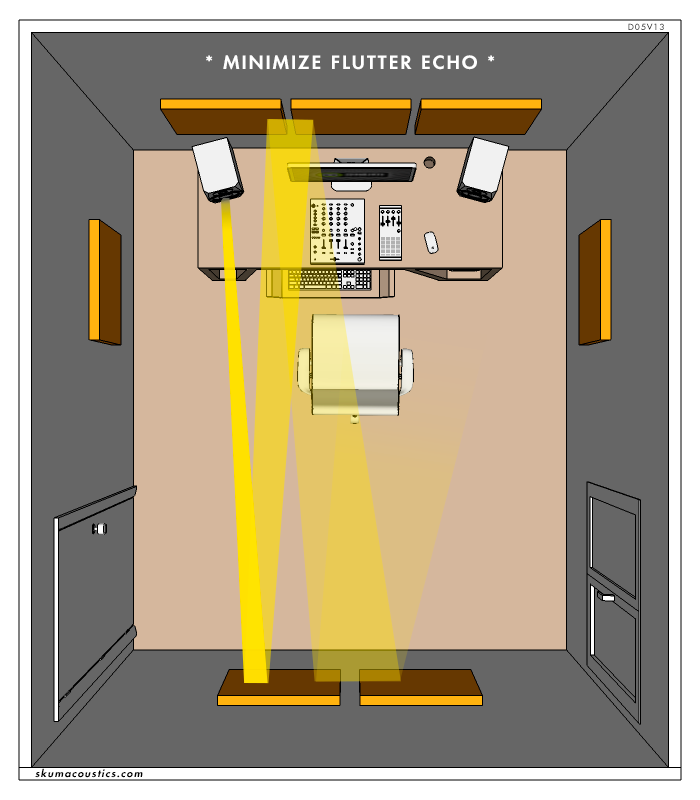
Diffusion- these are surfaces that scatter the sound that reflects off of them to different direction and timing which can provide a smoother room sound
We actually currently have no diffusion in our studio because our rooms are so small (absorption is usually much more effective for smaller rooms) but I am definitely going to look into building a couple for the Live Room and maybe the back of the Control Room to see how they effect the room's character. I'll post the future results here on Steemit!
Conclusion
I really didn't know what direction I was going to go when I started this post but think I gave a good little overview of Knock Knock's inception. Also it should be mentioned we built all of our own treatment, snake boxes, speaker stands, benches, and even our desk in the Control Room in the image above. Depending on what people are interested in I can go in further detail into ANYTHING mentioned above, from my path deciding to build a studio to nitty gritty detailed questions about construction or audio engineering. Comment below and let me know what your interested in learning more about!
Bonus/ Shameless Self-Promotion
-Hashbrown
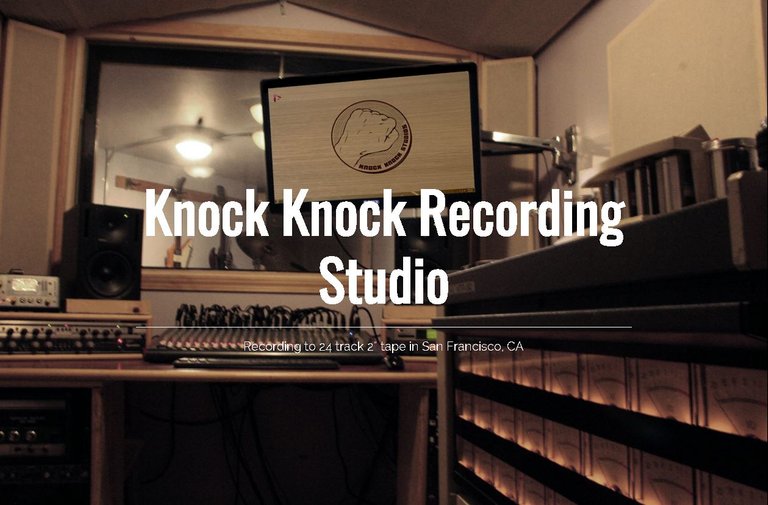
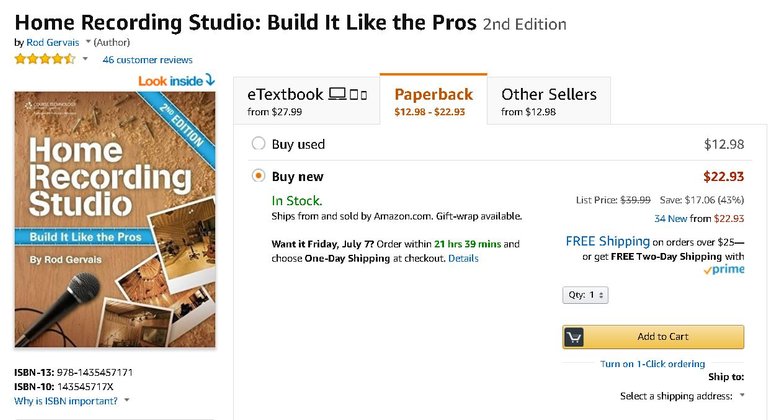
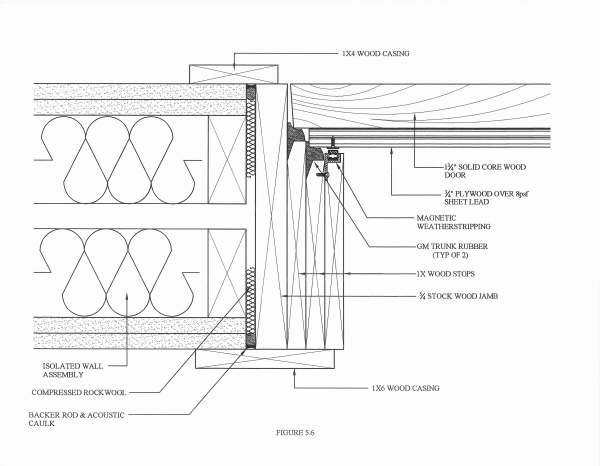
very complicated... i love it.
thanks, it was definitely more of an ordeal than I initially anticipated but has paid off more than I expected also so it balanced itself out in that sense!
Thanks for sharing this great post. Very helpful! I have an idea in my head to have home studio with my girlfriend - she is DJ and can be good to organize and upgrade ourselves and all things that we do together.... One more time - Thanks a lot!
yeah do it! let me know if you need any advice or input on anything!
That pretty awesome. To build and design a recording studio from scratch takes a lot of guts. You may even get a much better result too. Thanks for sharing.
Thanks! Yeah, it was quite a bit of a risk but it turned out quite good and the music speaks for itself!!
great Acoustic audio engineering
thanks, appreciate it!
I just saw this studio today in person, and I have to say, SUPER IMPRESSIVE. Built from Scratch but SOLID And SOUNDS GOOD. wow. Nice work dude. The hard work pays off.
thanks man! it was great meeting you and learning more about Musicoin! super excited to move forward with the platform and helping get artists I know onto it!
Please see your post mentioned here
wooo thanks for the resteem and share!!
super cool project ... I personally build a recording studio for Hotnewhiphop.com , i will share some photos and videos... music studios ,isolation booths are little complicated to build, but results are unbelievable.
Nice! I record mostly hiphop here, small world. Yeah, isolation booths are definitely worth the time put into them!
WOW impressive! upvoke it
Thanks, it was a ton of work but definitely worth it in the long run!